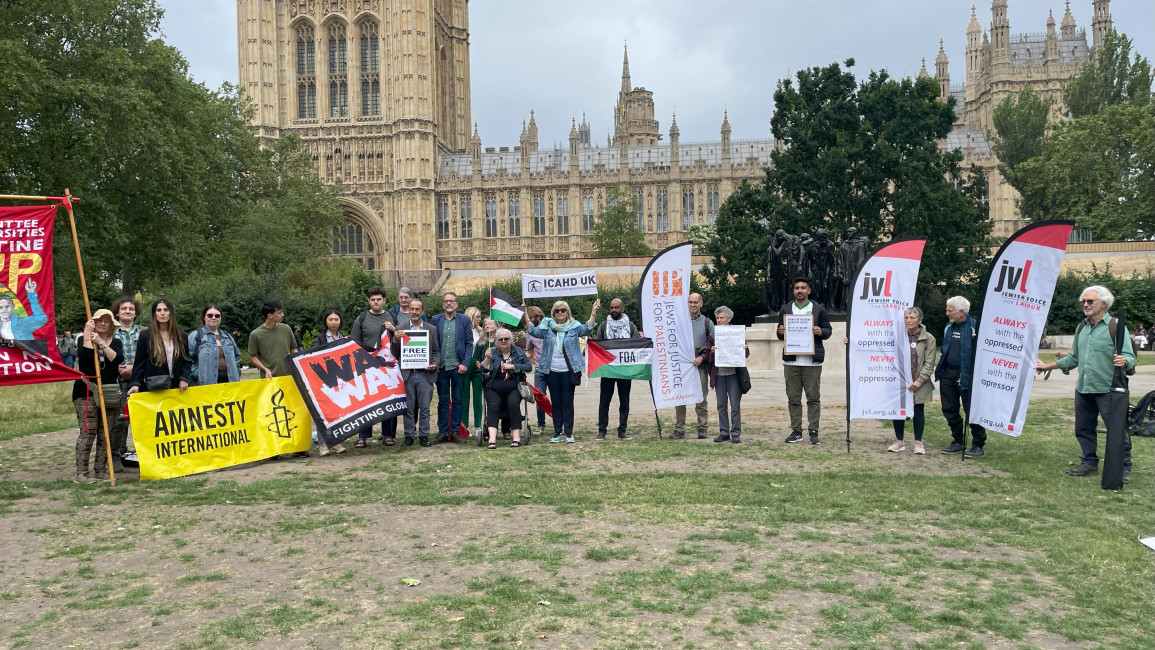UK 'anti-BDS' boycott bill set to return to parliament in January
The UK government's controversial anti-boycott bill is set to return to parliament early next year in a move the Palestine Solidarity Campaign (PSC) said demonstrates "complete contempt" for public feeling.
Penny Mordaunt, the leader of the House of Commons, announced on Thursday that the third reading of the Economic Activity of Public Bodies (Overseas Matters) would take place on 10 January.
The proposed law seeks to block public bodies like councils from conducting their own financial campaigns against foreign countries and territories.
"The government's decision to bring the anti-boycott bill back to the House of Commons in January demonstrates its complete contempt for public feeling and democratic principles," PSC campaigns officer Peter Leary told The New Arab.
"Although the bill threatens to undermine all those who use boycott and divestment tactics to campaign for progressive causes – for instance, against climate change or for human rights around the world – ministers have made clear that the main target of the anti-boycott bill is campaigns in support of Palestinian rights.
"Faced with the ongoing horrors that Israel is inflicting – collective punishment, the forced displacement of populations, and the deliberate killing of thousands of civilians and targeting of civilian infrastructure including schools and hospitals – we must demand that MPs vote against this bill and protect our right to campaign democratically in solidarity with the Palestinian people."
The New Arab contacted the UK's communities department, which is responsible for the anti-boycott bill, for comment, but did not receive a response by the time of publication.
The government's proposed law is widely viewed as an attempt to stifle the Boycott, Divestment, and Sanctions (BDS) movement against Israel. Communities Secretary Michael Gove said during a debate on his bill earlier this year that the Palestinian-led campaign "leads directly… to antisemitic incidents".
BDS co-founder Omar Barghouti told The New Arab in July that the movement opposes all forms of racism, including antisemitism.
'Above the law'
The anti-boycott bill explicitly mentions Israel, the occupied Palestinian territory, and the Israeli-occupied Golan Heights.
It comes in a clause that would make it harder for future exceptions to be made to allow public bodies to boycott Israel.
"No other state in the bill has this privilege for being above the law, above accountability," Barghouti said during his July interview with The New Arab.
"By putting it there, basically, the British government's saying: 'We're allying ourselves with the extreme far-right Israeli government, the most racist, fundamentalist, authoritarian, sexist in Israel's history – in 75 years.'"
In response to a request for comment on Barghouti's interview, a British government spokesperson said in August that public bodies shouldn't be "pursuing their own foreign policy agenda".
"The Economic Activity of Public Bodies (Overseas Matters) Bill will ensure that the UK speaks with one voice internationally," the spokesperson added.
But the proposed law has been met with heavy criticism, including from Human Rights Watch's UK director Yasmine Ahmed, who appeared before a parliamentary committee in September.
She said: "I'm a lawyer and I've been working in this jurisdiction for a number of decades now, and I can say that I have never read a piece of legislation that is as badly worded as this.
"It is ambiguous. It completely runs… coach and horses through ESG [environmental, social, and governance] responsibilities and business and human rights responsibilities, and I think it's a very pernicious and worrying piece of legislation."
Parliamentary process
The third reading will be the final chance for the MPs in the Commons to debate and vote on the bill.
If approved, it will then need to pass successfully through the House of Lords, parliament's upper house, before it can become law.
The latest step the bill completed was its report stage in the Commons on 25 October.



